#venture bros art book
Explore tagged Tumblr posts
Text





"21 and his arc is really what The Venture Bros. is all about."
156 notes
·
View notes
Text

some weird indie comic i found in my uncles basement,, how much do you think i can get for this?
#venture bros#the venture bros#the venture brothers#venture brothers#adult swim#the monarch#dr mrs the monarch#dr girlfriend#hank venture#dean venture#rusty venture#brock samson#the mighty monarch#monarch#sheila fitzcarraldo#malcolm fitzcarraldo#jonas venture#go team venture#brusty#adult cartoon#comic books#comic art#pete white#billy quizboy
413 notes
·
View notes
Text

By Sensitive_Tie5382
79 notes
·
View notes
Text
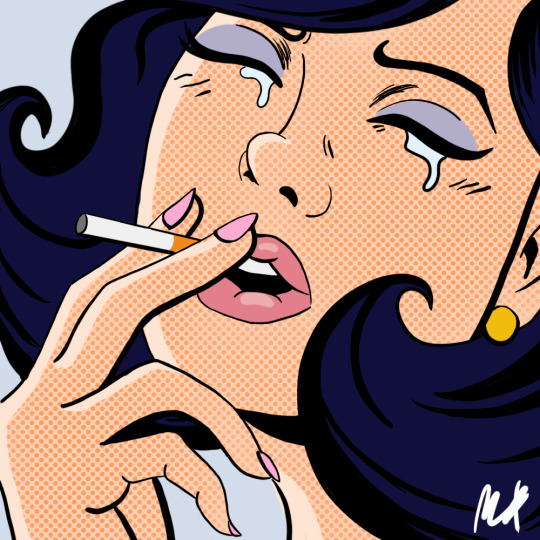
Watching Venture Bros for the first time and I had to draw Doctor Girlfriend in the pop art style. 🦋
#art#digital art#my art#illustration#venture bros#venture brothers#Doctor girlfriend#doctor Mrs the monarch#the monarch#pop art#comic book style
170 notes
·
View notes
Text

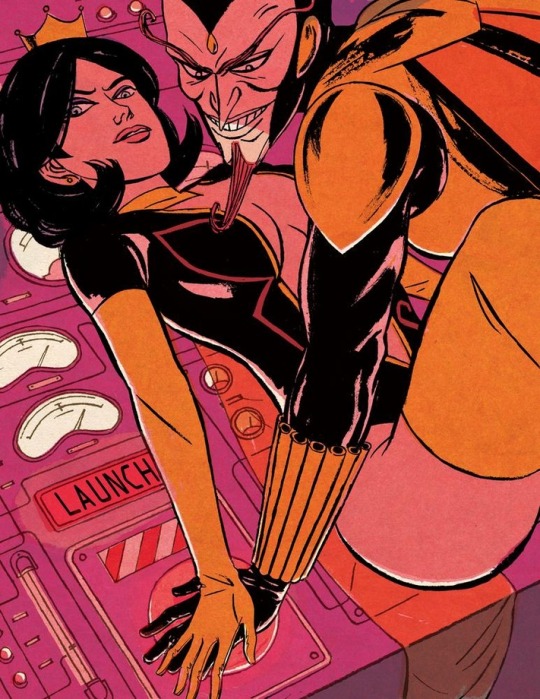

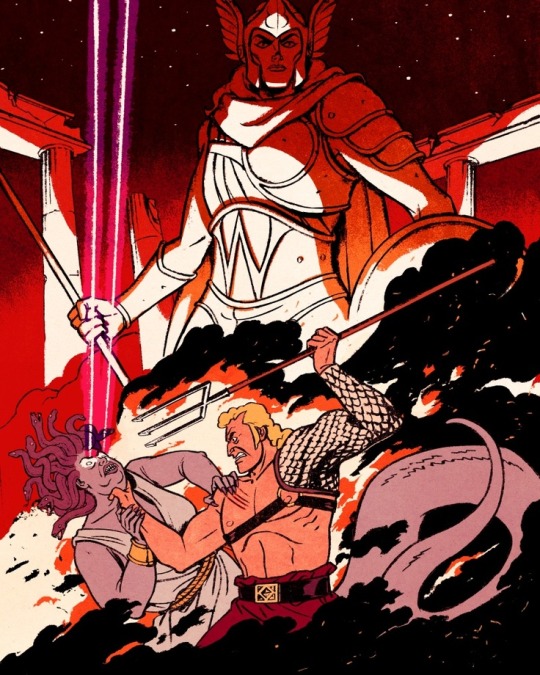
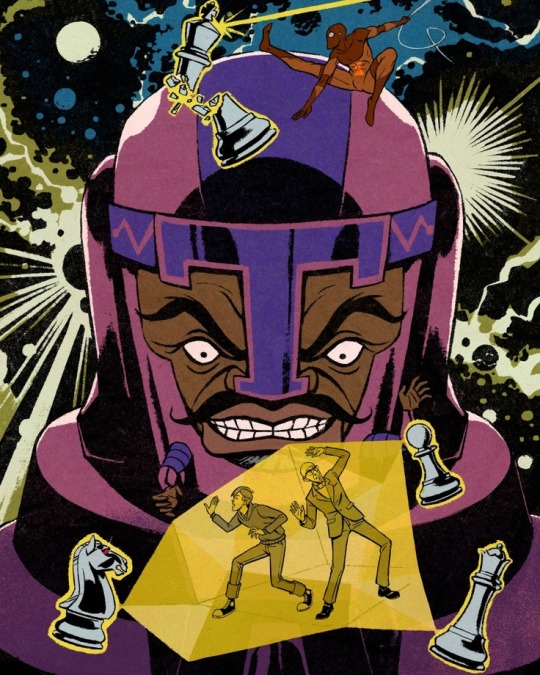
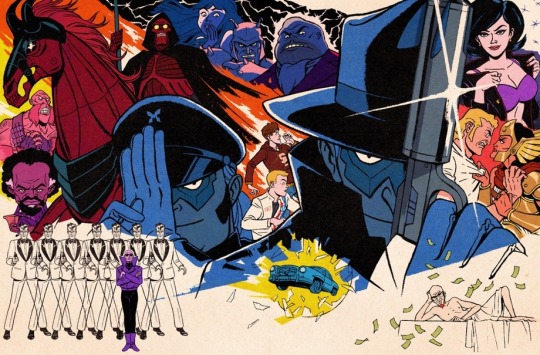

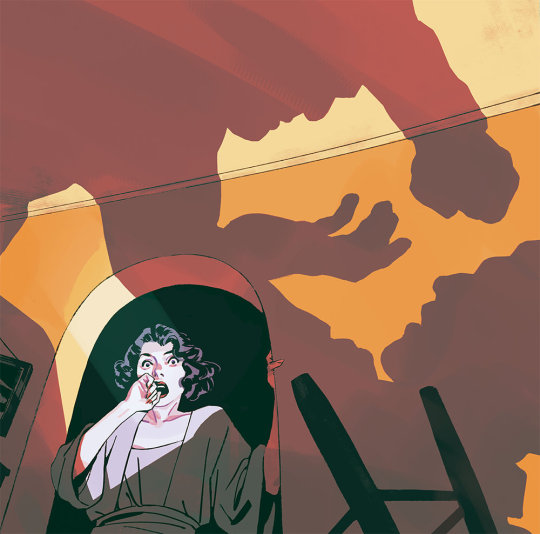

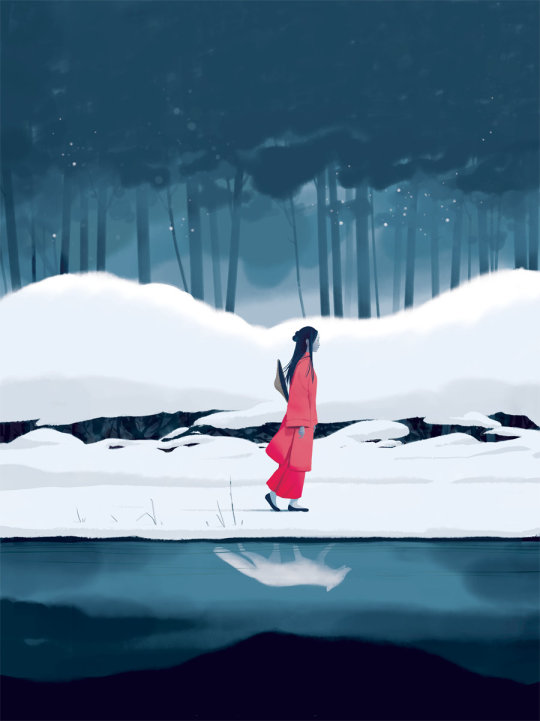

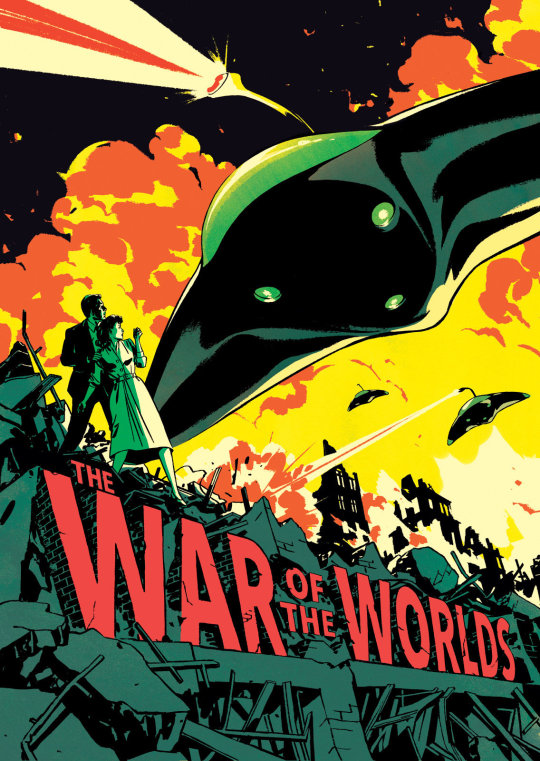
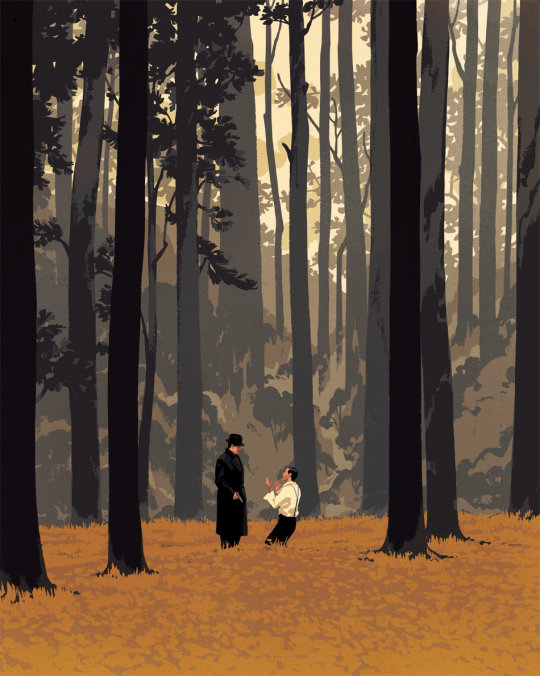

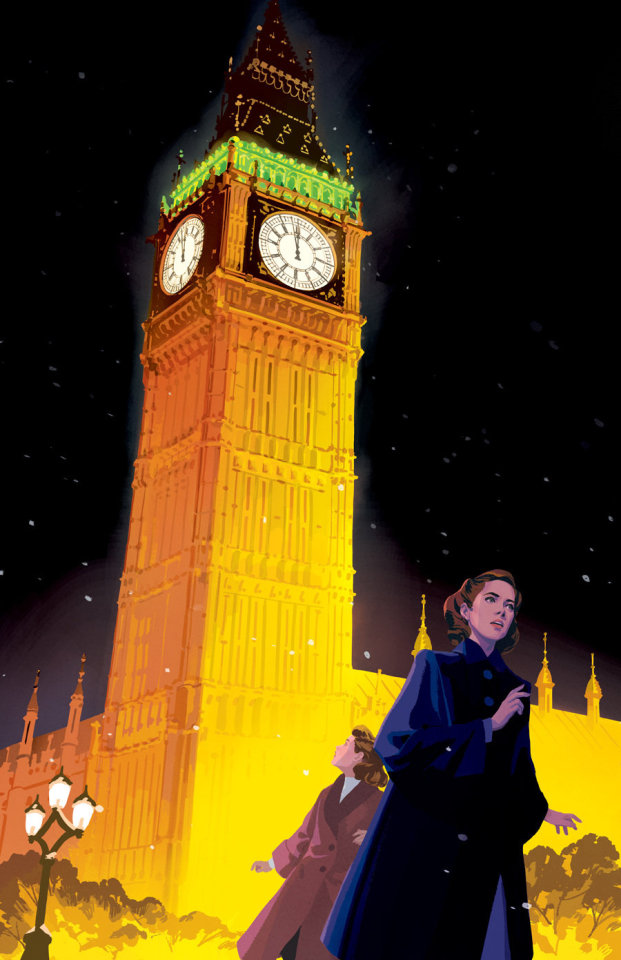

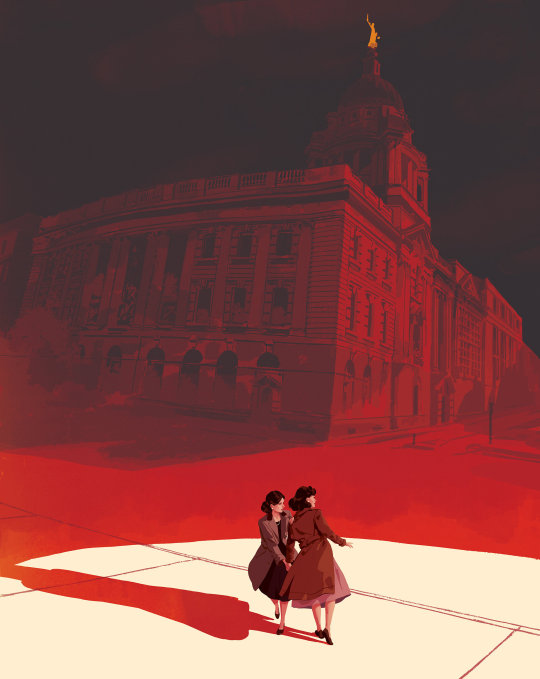

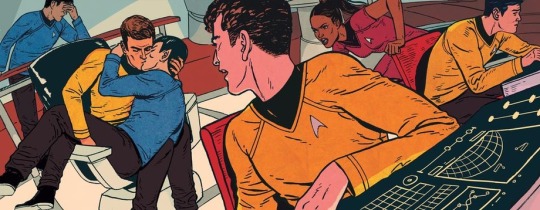
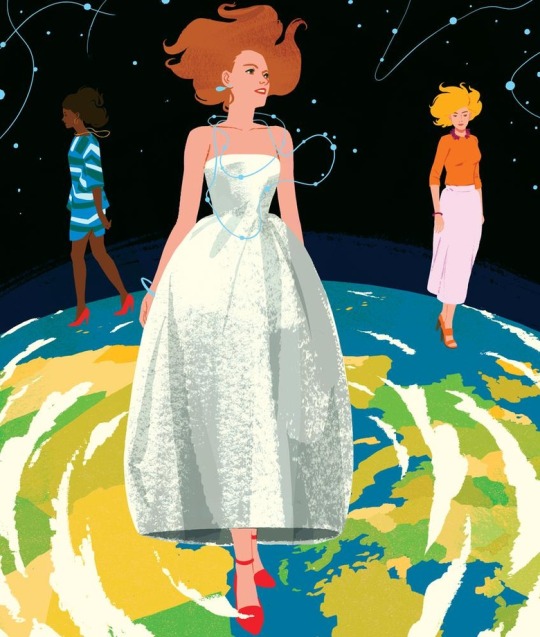




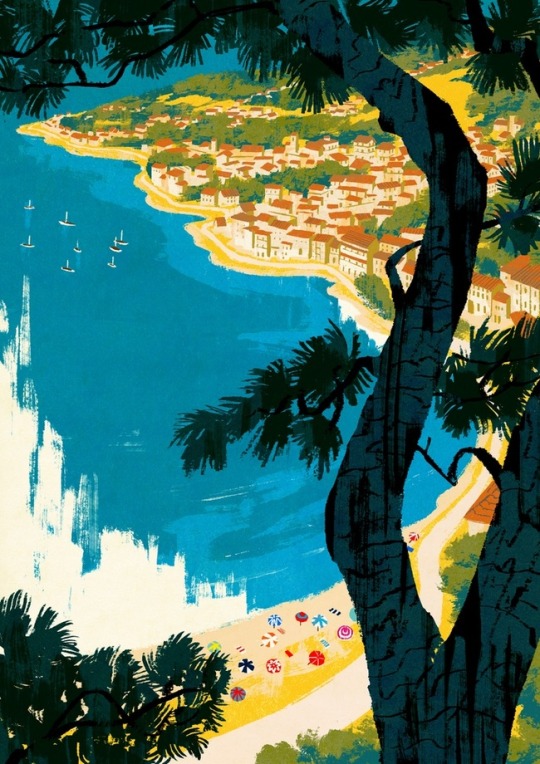
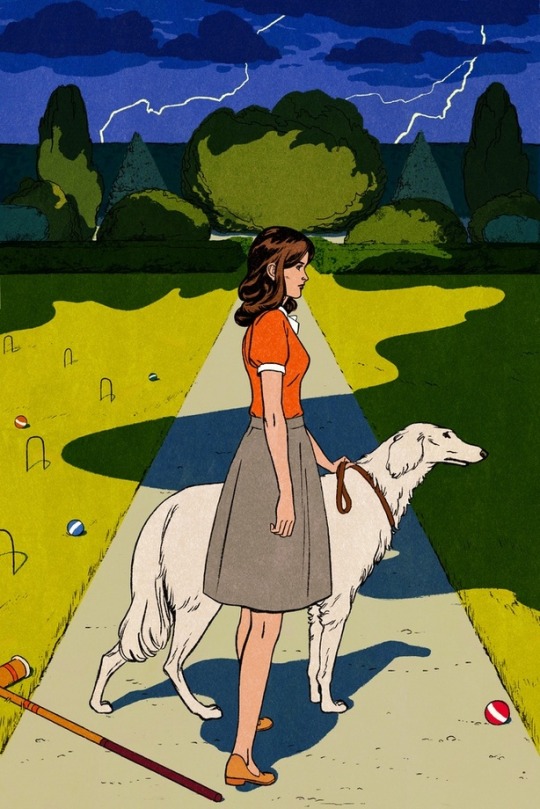
Showcasing art from some of my favourite artists, and those that have attracted my attention, in the field of visual arts, including vintage; pulp; pop culture; books and comics; concert posters; fantastical and imaginative realism; classical; contemporary; new contemporary; pop surrealism; conceptual and illustration.
The art of Patrick Leger.
#Art#Patrick Leger#Venture Bros#The War Of The Worlds#Top Gun#Top Gun Maverick#Star Trek#Books#Book Cover#Book Cover Art#Cover Art#Miller's Crossing#The X-Files#Illustration
213 notes
·
View notes
Note
For the art requests, can I ask that you draw Pete and Billy? :3
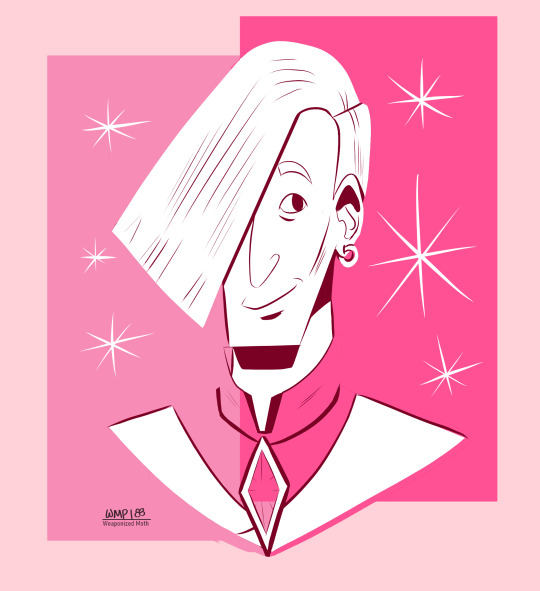
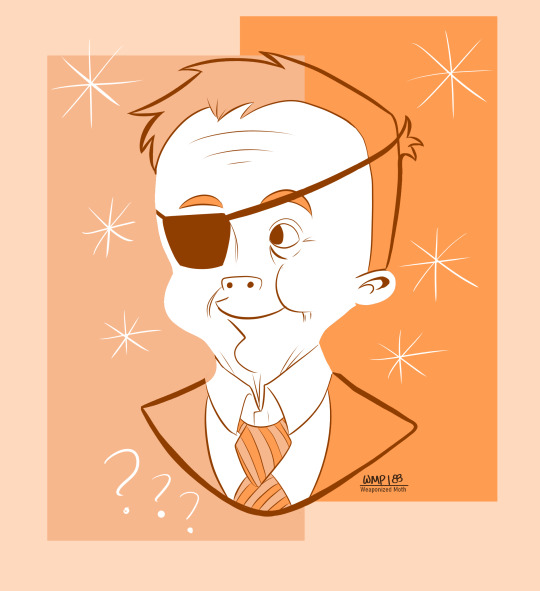
They're my favorite characters, thank you for this.
#reading the book and seeing them be like “oh yeah no one liked Billy and White as much as we did” I was like ??????#and Doc Hammer saying he wrote the ep of them meeting out of spite and I was like “that's one my favorite episodes”#insane#they're my faves and also one of my weirdest ships like they've been married for 30 years and no one told them#anyway#billy quizboy#pete white#vbros#billy wheelan#the venture bros#venture bros#the venture brothers#fanart#art#wmp requests#my art#vbros art#artists on tumblr#digital art#artwork#100
118 notes
·
View notes
Text
I have no space in my room for anything anymore and i only take up 1/4 of my big ass bed so i guess the arcane art book is sleeping with me from now on
#OR its gonna join my $600 venture bros art book in my closet on top of my clothes#talkys#sorry that shit is still so funny to me. my now almost $600 paperweight i love it
20 notes
·
View notes
Text
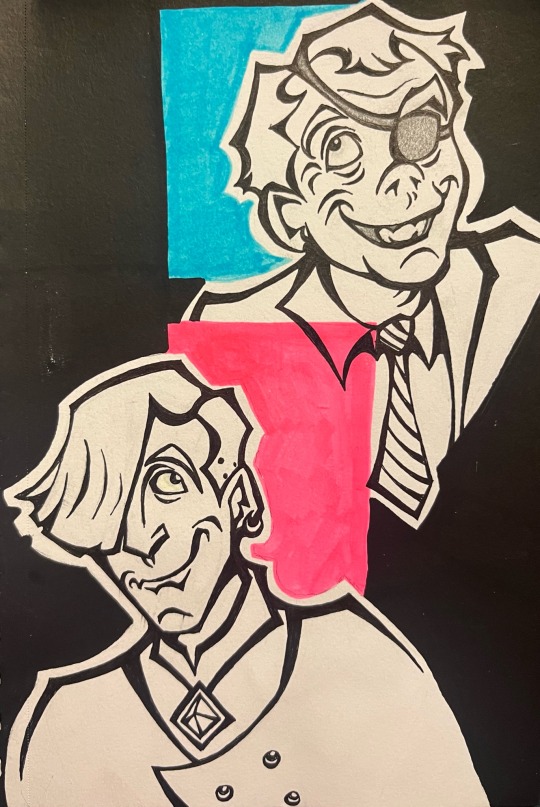
Conjectural technologies
#my arte#the venture bros#pete white#billy quizboy#this was like the last page in the sketchbook I just finished but I really like it and really wish it was in my new book noooooo
67 notes
·
View notes
Text
Have downtime operating a show rn...
...M...must doodle



#the venture bros#vbros art#dan vs fanart#dan vs#drawing on any paper adjacent thing I am handed#need a sketch book
30 notes
·
View notes
Text
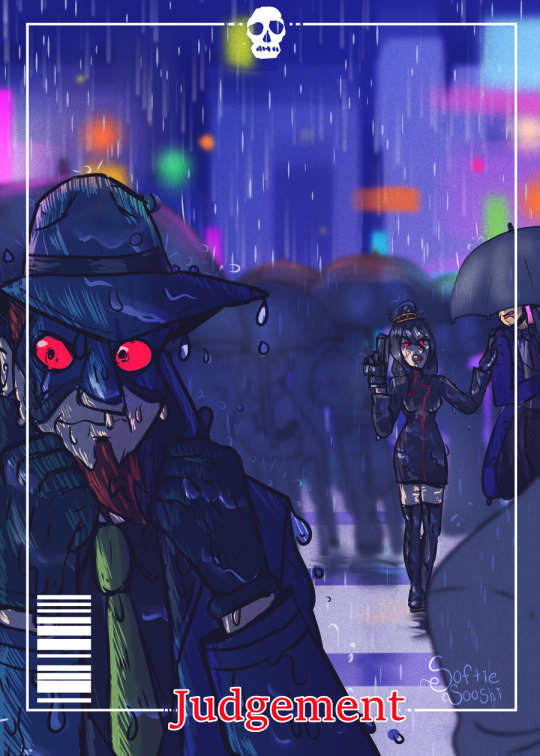
First card in a Vbros tarot series, I'll be casually working on and off~
.
.
Complete Tarots
#venture bros#blue morpho#dr. mrs. the monarch#vbros#my art#clip paint studio#digital art#tarot card#so happy with this!#wanted the frame to have comic book vibes????#i feel i captured that~#vbtarot
48 notes
·
View notes
Text




THE ORIGINAL ENDING OF THIS EPISODE WAS EVERYONE COMING TOGETHER TO STONE PHANTOM LIMB TO DEATH.
Plus the characters having real, sexy lives, the henchmen's wedding song, and Hank and Gary's friendship.
156 notes
·
View notes
Text
my girl(s) | choi san
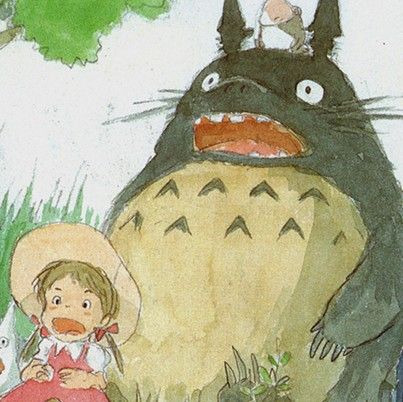
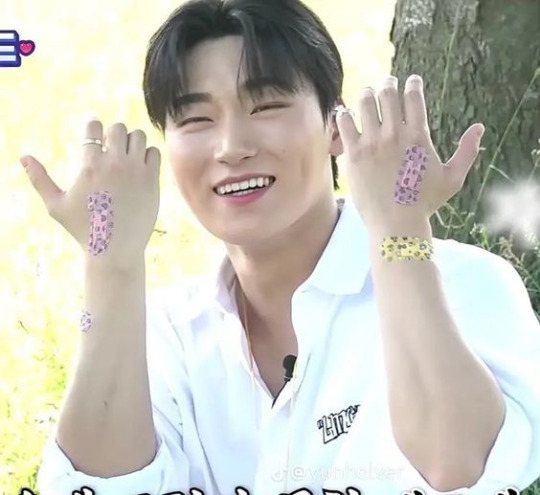
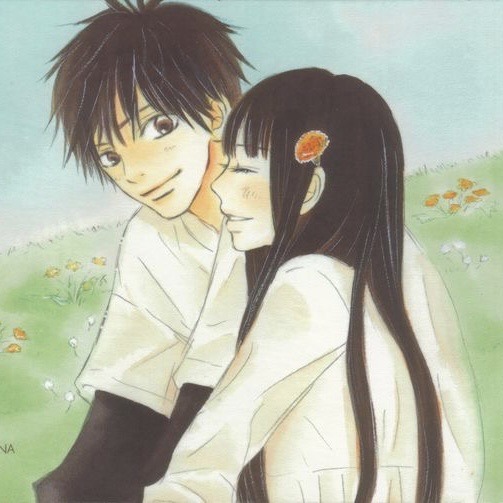
word count: 1.27k hehe
genre: fluff bro so much, slight childhood friends to lovers, established relationship, soon to be dad!san x pregnant!reader
warnings: san just worrying too much that he gets exhuasted
song playlist: my girl - the temptations, be my baby - the ronettes, la vie en rose - èdith piaf
author's note: seeing san get heated about how that one husband treats his wife made me think about how sweet and caring san would be in a relationship and then i started playing fifties's music and boom here where we are
choi san was just an absolute gentlemen, it was one of the many reasons why you loved him so much.
you vividly remember when you were younger, san declaring to the dinner table that his wife's hands will never be wet in the future, promising that he will be doing everything for her which impressed all the other neighborhood parents. a few parents joked at him to remember their daughters in the future which you rolled your eyes at. san was obviously bluffing and trying to impress everyone. you found it hard to believe that a man would be able to care so much for his wife like san said.
it was almost laughable how wrong child you was.
san quite literally did everything around the house, always insisting that you go lie down and relax even though he just came home from work. it was definitely a hassle trying to get your husband to relax let alone sit down after dinner since he was always insisting that he did the dishes even if he cooked.
"san, baby go shower," you whisper into his ear while he was doing the dishes, "let me do this. go relax."
instantly turning around in protest, san folds his arms in front of his chest, "no."
"san," you warn, the mother in your voice coming out.
"absolutely not." san protests, standing up even taller to tower over you, "you are my pregnant wife who needs to rest. i need my girls to rest."
"san, we don't even know the gender yet." you argue. it was only today that you found out you were pregnant after you realized that you were two weeks late and sped to the nearest drugstore for a test.
"i know but i think we're having a girl." san says knowing with smile on his face, he was just getting excited at the thought of having a baby girl. "still though, you should rest."
"san, i'm fine, you on the other hand should rest."
"but-"
"who has a eight hour shift at seven am tomorrow baby?"
"i do." san dejectedly answers with a pout on his face. san didn't hate his job as a martial arts instructor but if he had to choose between you and his job, he would choose you without a doubt over and over again.
"i promise when my belly grows you can pamper me all you want but not yet. you still need to take care of yourself before i'm unable to take care of myself."
"promise?" he asks as he intertwined his fingers with you.
"promise." you answer before sealing the deal with a kiss.

a few months later, when the baby bump began to show, san became even more protective of you.
finally on your maternity leave, you spent the time at home reading parenting books and knitting clothes for your baby making an assortment of colors. sometimes, you ventured down to the dojo that was connected to the house causing san to stop whatever he was doing and guide you down the stairs.
"yah! choi san!" you shout at your husband who completely abandoned his lesson to aid you, "i can walk down just fine! go back to teaching!"
"no!" he argues before turning back to his class to yell, "five minute water break!"
a collective "yes sir" was heard from the group as the students dispersed to the sidelines.
"san, i love you but i promise i'm fine!"
"i know, but i still worry over you my love." san confesses as he carefully holds your hand as you walk down.
"aigoo..."

closer to your date, you spent most of your days either in the dojo working at the front desk so that san could keep on you (more like you could keep an eye on him) or upstairs reading more parenting books and preparing the baby's room.
"how's the baby?" wooyoung asks, an old friend of san who occasionally stopped by the dojo to check up on you and take out san to relax.
"doing great! the doctors are saying the baby is healthy and don't see any problems or complications yet."
"ahhh, that's great to hear! how's san doing though? still stressing?"
"oh you bet he is." you sigh, running a hand through your hair. "taking him out for a drink tonight?"
"trying to but you know he doesn't like to leave your side."
another sign escapes your lips, it was possible that san was stressing you out by not being able to relax. "i'll convince him. he's been worrying too much."
"good luck with that one." wooyoung laughs.
"woo!" your husband shouts at his best friend coming out of the studio to the front with a towel in hand. "what brings you here?"
"just checking in your wife and the baby." wooyoung starts before flashing a quick glance at you, "but the boys and i are about to head down to the bar if you wanna grab a drink."
"ahhh, you know i would love to but," san says looking down at you with a smile. lately he's been running around the house trying to satisfy you're weird pregnancy cravings and help with the morning sickness all while still working full time down at the dojo. the stress and exhaustion was evident on your poor baby's face as the eye bags deepened and he wasn't his cheery self.
instead of returning the smile, you frown at him confusing san. "go sannie, i'll be fine."
"don't-"
"san, i will be okay." you laugh a little, trying to ease san's nerves, "i'll be down the street okay, baby? you deserve a break."
san looks back at wooyoung who looks eerily similar to the devil on his shoulder. "are you sure? what about dinner?"
"your mom dropped off some soup for us earlier, i can eat that. go out, have fun! you need to have some fun once in awhile baby."
"fine, but not too late." san complies while pointing a finger at wooyoung.
"i promise to bring him before eleven ma'am." wooyoung promises saluting to you before shooing san to go get changed.
"take care of him woo!"

the day of the pregnancy was absolutely terrifying yet exciting. it was the thrill of finally becoming parents that was the only thing keeping you sort of calm. your mind wandered every now and then to the idea of you being a bad mother but san was quick to shut down those thoughts.
you guys still didn't have any idea of what the gender was, deciding it would be fun to find out the day of. san was still confident that you guys were going to have a girl even though all the ajummas begged to differ with their superstitions.
"it's a girl!" the doctor exclaimed cuddling the newbown baby.
"i told you!" san shouts jumping into the air out of excitement before wrapping his arms tightly around you, his lips on your forehead. "thank you. thank you so much." tears of happiness flowed from san's eyes as he held you close, his warm embrace making you feel overwhelmed with his love.
"i love you so so much." san cried into your neck as he looked through blurry eyes at you cradling your daughter.
you couldn't even say anything too tired and overwhelmed to give a proper response. instead, you just cried with san holding the baby so close to your heart.
it felt refreshing? calming? something like that to be able to cry away your emotions. even the worries of becoming a mother washed away and instead hope and excitement for the future replaced the negative thoughts. you couldn't believe that you finally have a kid with the love of your life, not even just the love of your life but your best friend in the whole wide world.
god, you were so lucky to have a san in your life and he was just as lucky or even more to have you in his life. now, the both of you were fortunate to have a third in your new little family.
san let out a sniffle before planting a wet kiss to the crown of your head, "my girls."
#the delusions delusioned here#ateez oneshots#ateez imagines#ateez x reader#ateez x y/n#ateez fluff oneshots#ateez fluff imagine#ateez fluff imagines#ateez fluff#choi san oneshots#choi san fluff#choi san imagines#choi san x reader#san oneshots#san fluff oneshots#san fluff#san imagines
2K notes
·
View notes
Text

I'd read it.
17 notes
·
View notes
Text
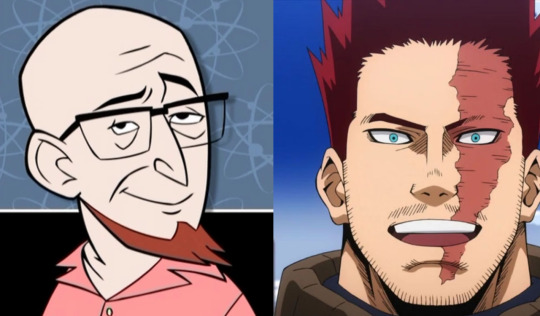
Dr. Venture vs. Enji Todoroki: How to Write Bad Dads
This is a post comparing two shows about two abusive dads who are the main characters instead of their children. My Hero Academia is a Shonen jump manga that takes inspiration from American comics and shonen manga. Whereas The Venture Bros is an adult swim cartoon that started out as a parody of Johnny Quest, and grew into a seven season long character study of former child star Rusty Venture.
The idea for this post came from the fact that I've noticed a common hot take from MHA fans that Endeavor's redemption arc is bad because it's wrong to make an abuser the main character.
I've always disagreed, and used The Venture Bros as an example of a show where making an abuser the main character works. Rusty is actually a well-liked character in the venture bros fandom. So my question is if these characters are both abusers why is one of them generally accepted and the other one so controversial?
Before we begin I want to say this is a story with fictional characters. Don't bring real life into the equation. We are doing literary criticism here and only talking about the events that happen in the story.
Anyway, My Hero Academia and The Venture Bros seem like the weirdest shows to compare but they are actually pretty similar. They are both comic book shows that are commentating on the comics they're inspired from.
What My Hero Academia is to Spiderman and Dragonball Z, Venture Bros is to Tom Swift Novels, the Hardy Boys, and old Hanna-Barbera Cartoons. They also make the decision to focus on the characters as people rather than heroes. They are telling the stories of real people that exist in a world overflowing with both heroes and villains.
1. Meet the Venture Brothers

If you've heard of the Venture Bros then you've probably heard of the premise that it's an adult parody of Johnny Quest. Johnny Quest for those of you who have a life and therefore haven't seen every old Hanna-Barbera Cartoon like I have is a show where eleven year old Johnny Quest travels around the world with his super scientist father Dr. Benton C. Quest and their bodyguard Race Bannon, going on adventures in Jungle Ruins or fighting villains.
In the Venture Bros the main character Dr. Thaddeus Venture is an emotionally abusive and neglectful father who constantly exposes his sons to danger in his trips around the world. Their bodyguard Brock Samson is a ultra violent and is basically a thirteen year old's idea of what a cool manly man is. The titular Venture Bros, Hank and Dean Venture are sheltered children who are constantly being chased around by men in costumes trying to kill them.
So the basic premise of the show lies in it's dark deconstruction of shows like Hardy Boys, Johnny Quest, these Tom Swift-esque stories where young boys go on adventures by showing the real dangers that children would be exposed to in that kind of life.
Between Johnny Quest, the Hardy Boys, and Tom Swift, what is up with these pie-eyed youths chasing pirates and international diamond thieves and stuff like that? They would get their throats cut the minute that stumbled upon a hideout. And that would be the gag. - ART AND MAKING OF THE VENTURE BROS.
The show does explore Hank and Dean's trauma, but despite the title of the show they are not the main characters. The protagonist is Doctor Thaddeus Venture who himself is other victim of the Boy Adventuring Lifestyle.
Dr. Venture: "Who was, for 43 years, the only son of Dr. Jonas Venture? Who, from the ages of 3 to 17 accompanied him on hundreds of adventures the chilling memories of which rouse him from sleep in a cold sweat to this day?"
Thaddeus used to travel around the world with his father the super scientist Dr. Jonas Venture who was a far more successful super scientist and hero. He's the former star of the "Rusty Venture Show" a cartoon based off of his travels with his father.
Jonas who continually neglected and gaslit him throughout his childhood to the point of not allowing him to go to therapy. He gaslit him so hard there's a scene where he literally pretends to be Rusty's therapist to tell his son to stop complaining.
Rusty: "So I don't know. Sometimes I wish I could just be a normal kid and go out and play with kids my own age and stuff. The only people I get to hang out with are grown ups. The only time I get to leave the compound is to go someplace creepy, like the Bermuda triangle, and then I get kidnapped, by grown ups. And I'm not even sure I want to be a super scientist when I grow up anyway, but I feel all this pressure because of my fa-It feels weird telling you this stuff." Jonas: "Remember Rusty, in here I'm your doctor not your father. Now let's get back to it shall we. You were telling me how you're ungrateful for all the opportunities your father's given you and you blame me for all your problems."
Rusty is both a washed up child star, and a faiilure to his father's legacy. He never formed an identity outside of being the star of the Rusty Venture show or the son of Jonas Venture. He drags his kids all around the world on crazy super science adventures because that's what he knows.
The central premise of the Venture Bros is that Rusty is basically stuck and cannot meaningfully grow up into an adult and his own person, despite the fact he is now a single father trying to raise two sons. The central theme is about three generations of one family, and what it says about the complicated nature of family itself,
As Rusty is both the victim and the perpetrator of the abuse it makes sense he is the main character the story centers around because he's the central link between Jonas and the Twins.
The themes can be summarized in one line said towards the end of the show:
BEN "Just a watch. Tells the time in two time zones. That fourth hand there? Little date window? Those are called complications. Complications make a watch special. More complications the more value. Read the engraving Jonas put on the back there. Elige Tua. It's Latin for Choose your family. Blood doesn't make a family, love does. Choose your family and remember that complications make it special."
In other words it's a seven season long show on how family is complicated.
2. Keeping up with the Todorokis
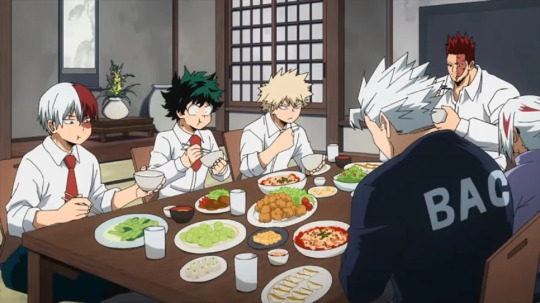
My Hero Academia is about a lot of things, but the central premise is that in a society where he quirk you were born with can determine a lot about your life, one boy without a quirk sets out to prove that anyone can be a hero.
If Complciations make it special is the central theme of Venture Bros, then the central theme of My Hero Academia is two sentences. "All People are not created equal" and "Anyone can become someone's hero" both said at different points in the story. The story itself is about Deku's attempts to overcome the first statement, that he was not born equal but he deserves to be a hero as much as anyone else because he represents the true spirit of heroes. That heroes don't just show up to beat the big bad, a hero saves people.
The story isn't just about Deku though. We're not even going to talk about Deku in this post, but rather the Tritagonist Todoroki Shoto.
Todrooki is introduced as a foil to Deku someone who is born with an extremely powerful quirk, but who's been groomed from childhood to be a hero.
Shoto's father Enji Todoroki is All Might's ultimate rival. In the world of MHA hers are highly commercialized and ranked by popularity and achievements and Enji has been number two his entire life. He decided to conceive of an heir that could surpass All Might instead.
He purchased a wife with an ice quirk for an arranged marriage to selectively breed for a child with a fire and ice quirk. When Shoto was born he raised Shoto up as a hero, forcing him through grueling training sessions from a young age, and beating his wife when she tried to intervene for Shoto's sake.
That's a lot and I didn't even cover all of it. After this reveal of Shoto's backstory, Enji seems like he's only going to be a one note abuser to give Shoto a tragic backstory to angst over.
However, later on in the show Enji ifinally becomes the number one hero only to realize how empty his lifelong dream has been. He feels remorse for the family he destroyed in pursuit of that dream and starts wanting to make ammends. After this , Enji basically becomes the second most important character of the "Todoroki Family" arc. . A lot of focus is put on Enji's attempts at atonement to the point where some accuse him of stealing the spotlight from his victims.
These two families have a lot in common. They are basically families who are not allowed to have normal lives because the patriarch of the family is a costumed hero. The hero is also someone who is generally well-respected and is considered extremely successful in their chosen career, but are terrible to their family members. They are a hero to the world and a villain to their own family.
If there is a central premise to the Todoroki Family outside of MHA's analysis of what exactly makes a hero, it's this:
Todoroki Shoto: "As a hero this endeavor guy is pretty darn amazing. But it's just like Nasu said. I'm not ready to forgive you... for abusing mom. So, heroics aside. What sort of dad are you going to be? That's what I want to find out?"
The challenge is if Endeavor can choose his family over being a hero.
You can se the parallels in Venture Bros, as Rusty's main struggle is to try to be a father to his twin sons and help them grow up while at the same time struggling in this dangerous worlds of super science. Rusty is a super scientist constantly getting chased around by guys in costumes, but he's also a normal father trying to raise two sons into adulthood with basically no idea what he's doing because he doesn't have a frame of reference for how fathers are supposed to act or what a normal childhood would even look like.
The comic book super scientist, and the comic book hero are expected to act like real fathers to their sons.
However, as I said above in Rusty's case it's pretty uncontroversial that he is the main character of his story, whereas Enji starts fights within the fandom very time he appears onscreen.
Why is this exactly?
It's not because it's offensive to have an abuser be the main character, but rather how these characters are written and how well they fit into their stories. As I said Rusty is naturally the main character of his story because he's the central link in the chain of abuse, but should Enji be the main character of the Todorokis? Does he fit as well as Rusty?
3. Who's your Daddy?
So as stated above Enji and Rusty simultaneously exist in worlds where heroes exist and yet they are also normal people who are expected to provide for their families and raise their kids. They both exist in what is basically the marvel universe, though in the case of Venture Bros it's the Marvel Universe fused with old Hanna-Barbera cartoons.
Because of this world some of the things both Enji and Rusty do are things that have no real life parallels. For example Rusty once created a machine using the soul of a dead orphan as a power supply. You can't do that in real life so I'm not going to use that as an example.
Both of these stories are drawing on real life parallels of parental abuse I'm going to be talking about those to tell what kind of neglectful parent each is.
Rusty raised Hank and Dean Venture as a single parent with the assistance of their body guard Brock Samson. They live on the Venture Compound and only leave when Rusty needs to take a trip around the world. Obviously, there's not many real life examples of parents taking their kids into egypt to fight mummies.
However, Rusty's main flaw as a parent is how much he shelters his children not allowing them to make their own choices. They are homeschooled until they are eighteen and almost never allowed to leave their home unsupervised. Rusty could be compared to a helicopter parent that feels the need to micromanage every aspect of their child's lives, sheltering them so much they're unprepared for the real world.
Rusty is a weird combination of controlling and neglectful, because while he doesn't let either of his childre go to public school aor interact with kids their own age, he constantly exposes them to danger. He is often disinterested in his kid's lives and puts most of the burden of protecting them and raising them on his bodyguard Brock, while he chases after whatever super-science project is occupying him at the moment. He's neglectful to dangerous extents too considering they're always getting cahsed around by crazy men in costumes.
Also, he lets them die a lot.
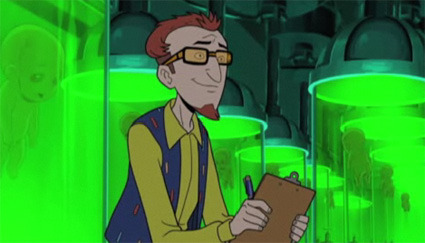
Hank and Dean have died several times over, only to be replaced by clones that Rusty grew in a lab with all the same memories. Once again there's no real life parallel to this, but it's interesting in the context of the show itself.
How do these children survive being chased by villains and constantly kidnapped? The answer is, they don't.
They die, and then Rusty just clones a new pair of boys. That in itself should make Rusty irredeemable but the show presents it in a more ambiguous light.
Dean: "You're telling me I'm a clone, that I'm not even Dean, that I'm some stupid science experiment." Ben: "No, no, no. You're Dean. There's no other Dean, you're it, flesh and blood. Look I was conceived in the back seat of a packard, you were conceived in a tank. So what?" Dean: "So I have no mommy? No nothing!?" Ben: "Dean, you have it all wrong. You have a mommy, and your dad is your dad. They made you by getting drunk and forgetting to wear a condem like everybody else, and your dad loved you so much that when you got a boo-boo, he kissed it and made it all better and made it go away." Dean: "You brought me back to life." Ben: "Yeah okay, well you and your brother had some pretty big boo boos. Have a kid one day, Dean. Hold it's lifeless body in your arms, and then tell me how wrong it is. Jonas, me, and yes your dad, saw it as nothing more than a fucking band-aid for a really big boo boo."
In the story itself it brings up the argument that if any parent was holding their dying child in their arms they'd want to bring them back somehow. That in the logic of the show it's the same as using magic to revive someone from the dead. At the same time it's not because Rusty's let his sons die multiple times and never changed his lifestyle because he can just keep replacing them with clones.
Super-science aside, it is kind of a metaphor for Rusty's parenting as a whole that his sons have been cloned and replaced so many times they're perpetually sixteen and never allowed to grow up. Rusty's so neglectful he's never taken an interest in raising them and this is the result, they literally do not grow up.
It's also probably relevant to mention that Rusty himself is a clone and died and was replaced multiple times much like his sons, and the technology for cloning Hank and Dean was invented by his father Jonas.
However, after season 3 the cloning lab gets destroyed, and the body guard Brock leaves the family. With the safety net removed Rusty actually starts taking a more active role in both of his child's lives. This is basically a mirror to Endeavor's moment of realization after getting number one hero that his entire family has grown up without him and they all resent him.
Season four onwards Hank and Dean develop into their own people outside of Rusty. He responds to them in different ways but he's actually parenting them this time instead of shoving them away like annoyances. Hank becomes rebellious and fights back against Rusty for a long time after Brock leaves because he no longer has a role model and Rusty's response is to always get strict and punish him.
Whereas when Dean rebels not only does Rusty tolerate it, he also spends a lot more time in Dean's life trying to push him into the direction of being a super-scientist like him, supporting his efforts to go to college, while basically ignoring Hank. It's a running gag in the show that Dean is obviously Rusty's favorite, but even when playing favorites Rusty by this point in the show has reasons for why he's making those parenting choices.
Rusty: "Dean believes in this crap! He should have been Rusty Venture, Boy adventurer. Hank got this life thrown at him. And he fights against it. Just like I did."
Rusty playing favorites comes from an attempt to overcorrect for both children. He rejects Hank because he believes Hank doesn't want to be a boy adventure and therefore pushing Hank away from his family and the Venture lifestyle is what he needs. Whereas, he believes that Dean embraces the super scientist lifestyle and he tries to mentor Dean into another scientist like himself therefore he gives Dean most of his attention because he thinks Dean needs that guidance from him.
Of course, Rusty is totally wrong about his sons. If anything Hank is the one who wants to be an adventurer whereas Dean just wants a normal life away from his crazy family but parents often misunderstand their children. He's not actively malicious, he's just misguided in what he thinks is best for each of his sons. He's not really even playing favorites in this case he's choosing to parent his sons differently based on what he thinks is best for each of them, it's just in this case father doesn't know best.
Rusty isn't a stagnant character, but also there's no big redemption arc for him the way there is Endeavor. Rusty never narrates about how he needs to atone for his past mistakes. The result is Rusty is a far more amoral character than Endeavor because he's not trying to atone but the narrative also isn't trying to spin Rusty in any way. It's just showing you Rusty as he is, and with all the bad things he does he's still capable of loving his sons.
The question isn't really "Is Rusty redeemable?" but "When is Rusty gonna grow up?"
Then there's Endeavor (everyone starts booing) who is simultaneously a much better, and far worse person than Rusty.
Enji is honestly more comparable to Jonas, an incredibly successful hero who built a career and an empire in heroics and fame and then tried to force his son into that same lifestyle.He's the exploration of that same idea a supposedly great man with skeletons in his closet. Enji technically has saved thousands of people (such as Hawks one of the other main characters). A person who is so good at playing the role of a hero no one would ever expect there are skeletons in his closet.
"Rusty's father was more successful than you could ever imagine. Jonas Venture Sr. was a manipulative narcissist admired by the world for his scientific accomplishements and his hyper-masculine James Bond meets Doc Savage public persona. He's a geniuine villain who was able to take everything he wanted from the world by seamlessly fitting into the role of everyone's hero." [Source]
Jonas is like showing everything nasty about using someone like James Bond as a male power fantasy. He treats women like objects, he thinks he's aboe good and evil, he's effortlessly charming and suave and uses that to get what he wants out of people. Enji similiarly is everything that is wrong with the ideals of hero society. A society that glorifies flashy, strong quirks that are the best for taking down villains. The only person who even seems to care that he's number two is Enji himself, beause Enji is otherwise rich and succesful, a pillar of the hero community, and allowed to get away with a lot because of his position and influence.
Enji is at least a better hero than Rusty, because Rusty is an incompetent mad scientist who does stuff like mutate college interns into four armed freaks and build death rays.
However, as a parent strip away his status as a hero and Enji is little more than a show parent, pushing his children into a life they don't want in an attempt to live vicariously through them. Once again, resembling Jonas more than he really does Rusty. As Jonas forced Rusty to be a boy adventurer, and then made a cartoon out of it to make money like any show parent.
It's also the idea that generation put that kids into films and it was a very horrible selfish thing to do, they were doing trying to live out their own lives through their kids. That didn't exist before that was something that boomers brought to the world. "Oh I can't be these fun new things I'll make you be it." I think Jonas was a pioneer of throwing his kid at the world. I think Jonas was something of a boy adventurer himself, and made his kid be it. But also put his kid on TV to cash in the residuals. Jackson Publick, DVD Commentary
As stated above Enji gave up on his ambition to be the number one hero and so he decided to create a son with the right quirk to surpass All Might. He then pressured a woman into an arranged marriage, basically purchasing her from her parents and conceived four children until he got his designer baby.
Chapters 301-302 the wrong way to put out a fire, detail the slow descent of the Todoroki Household from Enji entering an arranged marriage with bad intention to create an ideal child to be heir to his legacy, into a full on child abuser. Enji is written like a normal person falling into a cycle of abuse, he never intended to hurt his children at first. Abusers aren't evil monsters, they're just people. Most abusers don't even think of themselves as abusers.
In fact he's shown positively bonding with his first born son who seems eager to learn to use his fire based quirk. He even mentions that he was alright at the time with the idea of Toya being the one to succeed him and letting go of his quirk experiment.
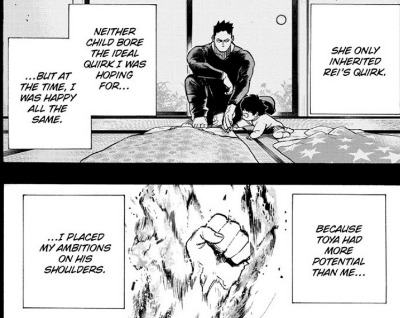
Enji only had kids to carry on his legacy, and only bonded with Toya because Toya was eager to participate in the training and become his heir. However, to give Enji some backstory it's quite clear the death of Enji's own father at a young age left him with no idea on how a father should act.

At a young age Enji witnessed his father attempt to save an innocent girl only to end up a burnt up corpse, and probably at that point conflated strength with being a good father. If his father had been strong enough he would have survived and continued to be a father to young Enji. At that point it's almost understandable that Enji thinks in his mind that earning his keep as the patriarch of the family, and being a powerful hero who will come home alive is the same thing as being a good father.
So Enji conflates masculine ideals of strength and heroism with being a good father, all the while not actually showing up to parent his kids. When Toya seemed like he could live up to Enji's expectations and be strong as a successor everything seemed fine.
However, Toya turned out to be disabled at which point everything in the household began to spiral out of control. After learning Toya could not use his quirk without burning himself, Enji tossed Toya aside and left raising him entirely up to Rei and then pressured her to have more children until one with his ideal quirk would be born.
Toya did not like his father ignoring him and began acting out for his attention. The response of everyone in the household was to politely tell Toya to shut up, because Enji while not being a parent is the money maker and authority in the household no one can stand up to him. When Toya's acting up got too out of hand, Enji would even hit Rei instead of just personally dealing with his son.
At the same time Shoto was finally born and being given his perfect heir after four attempts, Enji eagerly began training him. When Shoto resisted him, Enji stepped up to threats of physical violence and long grueling training sessions to force him to learn. All the while Toya continued to mentally spiral.
One day after his flames turned blue Toya asked his father to meet with him on Sekoto Peak. However that day Enji didn't show up, and Toya lost control of his flames starting a massive forest fire that killed him. Rather than changing anything after his firstborn's death, he doubled down and pushed Shoto even harder.
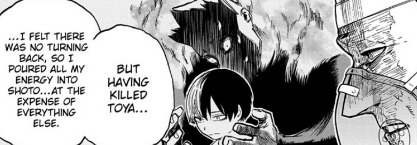
While being a far worse person, as a parent Rusty is far less malicious. He neglects his kids similarly to Enji at first, but when the safety net is removed and he can't keep cloning them anymore he actually does start taking a personal interest in their lives. Maybe it's too little too late because it's the 14th version of Hank and Dean but he does hear the wake up call and change his ways as a parent.
Enji always doubles down on ignoring his sons in favor of heroics when given the chance to be a father.
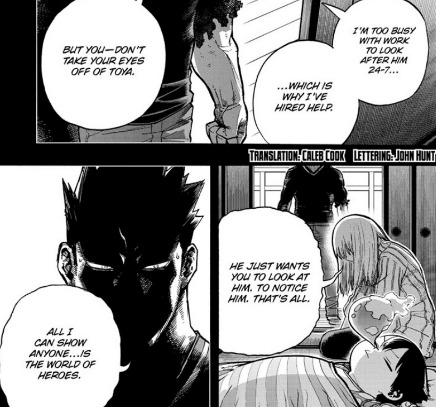
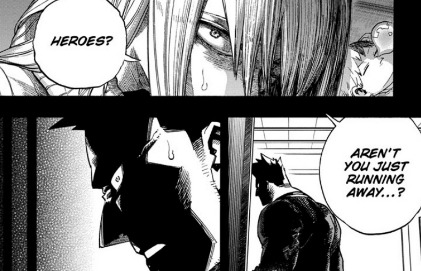
Even post redemption arc Enji behaves in the same way. There is no point in the story so far where Enji actively chooses to help or be a parent to one of his sons, when he can choose to be a part of a big important battle instead. Let me break out the list:
In the Pro Hero Arc Shoto sets the challenge for Enji to show what he can be like as a father rather than a hero.
In the internship arc Enji trains Shoto up as a hero but not a father. When he brings the family home to dinner they're attacked by a villain and Enji stands and watches as his son Natsuo gets kidnapped y a villain because he felt like it would be too awkward if he saved Natsuo because then Natsuo might feel inclined to forgive him.
In the War Arc aftewards Toya is revealed to be alive the entire time, and when given the chance to see his dead son come back to life, Enji not only does nothing but he sits and watches as his oldest son tries to kill his youngest without trying to talk to or appeal to Toya.
After the war arc, Enji doesn't bother looking for Toya and goes back to his job as a hero hunting down AFO. He also makes a promise to Shoto that they'll search for Toya together, only to break that promise multiple times.
In the second war arc, when Enji is given a chance to face Toya face to face, he instead sends his other son Shoto to fight him, while Enji fights against the big bad instead as the number one hero.
When Toya is literally dying and about to burn himself alive in front of him, Enji who has chosen to run away from Toya too many times by this point picks the murder suicide option and chooses to try dying with his son in a heroic sacrifice.
Every single chance he is given to act like a father, he acts like a hero instead. Enji Todoroki never steps out of the role of the hero Endeavor. Internally he's changed, yeah. He's remorseful now and realzies what he's done wrong. However, externally he hasn't. He doesn't do anything different. He neglected his family for his job his entire life so his way of making it up to them is... to keep going to his job.
The problem isn't whether or not he deserves to be redeemed, but rather that there's no change in his actions. Endeavor at the beginning of the story would have shown up to fight AFO in the war arc too, because being the hero is what he does. It's the only thing he does. The story never asks him to be anything other than a hero.
Which is I think a fundamental difference in Rusty and Enji in how they're written. Rusty is a flawed parent, but he's still a parent.
He does favor Dean over Hank, but that favoritism takes the form of him giving Hank more chores when Hank acts out, but when it's time for Dean to rebel giving him space and letting him have his own separate room in the attic. It's Rusty letting Dean have access to the family checkbook so he'll have spending money at college, but cutting Hank off from the checkbook because they agreed if Hank didn't want to go to college he needed to find a job to support himself.
Rusty is parenting these children. He's parenting them very badly, but he's still their parent. Enji never wanted to be a parent to begin with, he wanted to be his kid's abusive gymnastics coach. He wanted a prodigy that he could push and push until they won gold at the Olympics.
If you ignore the fantasy elements then you're left with how these men are shown interacting with their kids in their day to day lives.
Rusty has absolutely no idea what he's doing, so even when he has good intentions he screws up. However, he is making an effort to guide these kids.
Enji was an intentional manipulator more in line with Jonas. He controlled everything in the household, and was actively trying to groom Shoto into someone who would obediently carry on his legacy. He made the choice to isolate Shoto from his siblings so he'd have more control over him. Rusty keeps Dean and Hank away from kids their own age and from having a normal life because he never had a normal life. He doesn't even know what a normal life looks like.
Enji for most of his life didn't want kids, he wanted heirs. He even purchased a woman so his heirs would turn out with the right genetics, and tossed aside the ones that were disabled or born with the wrong quirk.
Rusty made the decision to become a parent on his own. In the last twist in the series it's revealed Dean and Hank had no mother. They were conceived in a test tube, raised in an artificial womb by Rusty himself. He is both their father and their mother. Kids were a deliberate decision on his part. He wanted to have a family, probably because his own childhood was so deprived of any familial love.

Dean: Okay, so who is our mom? Rusty: Seriously, Dean haven't we had enough family history for one day? I don't even know who my mom is. All you need to know is that the person who gave birth to you. I promise they do.
Remember as stated above the central thesis statement of Venture Bros is "Elige Tua - Choose your family". Rusty chose to bring those kids into the world because he wanted to be a father, it's an active choice his character makes.
Whereas the central statement of Endeavor's arc is "So, heroics aside. What sort of dad are you going to be? That's what I want to find out?" but we never witness Enji doing anything outside of being a hero.
Even post-redemption the only time he ever spends with Shoto is when they're either doing quirk training or working as heroes together. Toya as a character presents this challenge to him, because he's Enji's son, but he's also a villain who's killed innocent people. If he's acting as a hero he has to put a stop to Toya, but a father is supposed to put the safety and well-being of their children above everything else.
We never see Enji make that choice to be Toya's father over a hero. Which is why in story he comes off as a worse father than someone like Rusty, because he never makes any attempt to emotionally bond with his children.
Rusty will sit Hank and Dean down and tell them stories from his childhood. He'll find common ground with his sons to bond over because they've both been subjected to the boy adventurer lifestyle.
Rusty: Dean what are you doing? Dean: Hyperventilating into my knees. That smell a little like spit up... because I spit up a little. Rusty: Dean, you just baby burped onto a speed suit. Not a super scientist alive that hasn't coughed a little acid onto his speed suit. Dean: Really? Rusty: Why do you think these things are like 95 percent polyester? You can clean off fear-vomit with a wet nap. Dean: I thought you were used to this. Rusty: Dean I remember when the action man would wake me up with a gun pointed at my head. He'd just hold it there and pull the trigger. I'd hear the click really loud because it was right against my forehead. Dean: So it echoed. Rusty: Right, it sounded like he snapped one of my teeth out. Click! Then he'd go, "Not day Rusty. Not Today." Dean: Golly, and you took it because you had to? Rusty: No Dean, I took it because I was Rusty Venture. Boy adventurer. I didn't ask for this life, Dean, but it's mine. Sure, I fall down in the Speed Suit but I get up and Wet-Nap my puke off.
We never get any moments like this with Endeavor and his kids.
He only goes so far as apologizing for his past abuse. Yes, maybe it's cathartic hearing an abuser apologize for what they've done but that's not the question the story was asking. It wasn't asking "Can Endeavor be forgiven?" It was asking "What sort of dad are you going to be?"
The narrative challenged him to learn to act like a father to his family, and he never did. He stayed in the role of hero from beginning to end. It might be cathartic for his victims to hear him say sorry, but it's not good for Endeavor as a character because he hasn't changed and we've learned nothing about him. We already knew he was sorry at the beginning of the arc. Endeavor is sorry and knows he's done something wrong has already been established, but by Endeavor stepping out of the role of hero and acting like a father we could have learned something new about him or his character but no he stays the same from beginning to end.
They're both awful people but at the end of the day Rusty is a father, and Enji is not.
Stories are kind of like essays your English teacher used to force you to read. You need to make a thesis statement in the story itself, and then have evidence to support that thesis statement. The theme of Venture Bros is choose your family, and family is complicated, and in support of that theme we have Rusty choosing to connect with his sons. Jonas is basically nothing more than Rusty's biological father. Rusty's chosen a different way to connect with his sons, and he is their dad, and they can bond about the complicated lifestyle of being a Venture together.
The actions Enji takes in his story don't line up with his thesis statement. The Todoroki Family subplot is supposed to be about how one family was messed up because Enji only chose to have a family to further his career as a hero, and choosing his career again and again made things worse. The thesis statement was that Enji needed to choose to be a dad, but he's never shown doing that in the story.
So Enji as a character seems like he doesn't fit in with his narrative. Which is what I said at the very beginning about Rusty and why he works as a main character. Rusty is the center, because he's had this horrible life inflicted on him by his father, and he's in the process of raising his sons but he still has a chance to choose to be better.
Enji could also work as the center of his story, he has a chance to choose his family over his work as a hero, but he's ultimately not the one who does that, it's Shoto. Which yes Shoto is the main character of the Todoroki plotline, but by the end Enji's gotten as much screen time as his son. If the plot was going to focus on Shoto and his choices to begin with then he should have been the central point. You spent a lot of in story time asking this question with Enji on whether or not he's going to be able to choose to be a father over a hero, and who Enji is outside of being a hero only to not give the audience any answeres.
This again has nothing to do with Enji the person and whether I think he's likable or not, because Enji's a fictional character. He's an idea. If writing is communication, then a writer is trying to communciate some idea with every character in their novel. We're asking what is the author trying to say with Enji, and do they do a good job of getting that message across?
4. What's the Big Idea?
So the above section was mainly about the personal arcs of each characters: How do both of them fail at fatherhood and do they learn to be better fathers over the course of their narratives?
However, these characters are part of a much bigger world. How a character interacts with both the world around them, and the extended cast of characters is another way a story relates it's theme.
Venture Bros and My Hero Academia both exist in comic book worlds. There are people running around in costumes calling themselves heroes and villains and fighting each other on the streets.
In My Hero Academia heroes are basically professional athletes who sell sports drinks and pose for ads and compete for rankings on a big board, and heroics for the most part has been reduced to a day job for people with particularly powerful quirks. Heroism is an entire industry that's for profit, and run by the shadowy hero council who has far more power over their society than they let onto. You could compare Endeavor being the top hero to him is like a combination of being the best pro athlete, and also the best salaryman ever.
Ironically, the worldbuilding of Venture Bros is pretty similar. In Venture Bros. the villains are all unionized. There is a super villain trade union. It's a secret organization known as the guild of calamitous intent, which makes villainy into a bureaucracy.
All villains in the world have to register with the guild. If you're a part of the guild you receive the protection that the guild offers, as long as you follow the guilds rules and regulations. There's lots of small rules, like you can't torture someone who's having a medical issue, and if you're fighting a good guy and they have a doctor's appointment you have to let them go.
They even rank heroes and villains by their threat levels called "EMA LEVELS (equally matched aggression) and then assign you a hero who's about your equal so you won't get killed by someone way stronger than you. The guild basically decides who you're allowed to fight as a villain and picks a hero for you. The act of being someone's arch villain is called "arching" you show up to harass them once a week like a Saturday morning cartoon villain, fight them, then do it again next week. You're not allowed to kill your hero and you're supposed to follow specific rules. The tradeoff is the heroes won't kill you either, because you have guild protection.
The Monarch: I don't know, just keep it cat and mouse not cat and missile. JJ:: So it's a game? We fake fight? That's ridiculous. The Monarch: No, it's like fencing, it's about the art of the fight. JJ: Well, I'm about to deliver my killing stroke. Then what? Dr. Girlfriend: Then the guild steps up their game. You throw a rock, they throw a knife. You throw a knife, they come to your house when you're sleeping and murder your family. The Monarch: Look Dr. Venture you call the guild and you get the damn rulebook, I'll be waiting.
The justification for why the guild exists is that in world if you didn't give the villains a system with a bunch of rules, then you'd have a bunch of crazy people in costumes running around causing havoc.
Brock: You wanna what? Shoot him? And all his men and his wife? You could steal his cattle, too. Maybe burn his village down? JJ: It's an antiquated system. I mean my father did this fake arch enemy nonsense in the sxities. Maybe my brother is good with this namby pamby guy in a costume chases you around nonsense, but I'm not. Brock: Hey no disrespect Jonas, but it isn't so easy. These guys like their system. It's what they do. You take that away and you're looking at a bunch of pissed off nut bags with ray guns, and giant -- i don't know, a giant octopus / tank with laser eyes.
The villains and the OSI (who are like the GI JOE) of this world have signed a very long and detailed treaty that keeps both sides in a cold world stalemate and lets them fight every week like how the good guys and bad guys fight constantly while maintaining a status quo where neither side wins.
In MHA heroics is a commodity. It's commercialized and sold to the public. Heroes are like professional athletes selling you sports drinks, it's a spectacle to the public, and it's even intentionally made to be that way by the Hero Commission who use heroes as a bright shining light to distract the public while they do shady things like assassinate antigovernmental protestors from behind the scenes. The entire of hero society in MHA is built on the spectacle of heroes.
In Venture Bros heroes and villains are a spectacle too. It's just a job to them. Heroes and villains both show up to work, get in their costumes, fight each other and then go home. In Season 6 of Venture Bros, a parody of the Avengers is actively charging people to provide their services as heroes in the city of New York and you have to sign up for a protection plan if you want to get saved. Then the local mob boss takes a cut of the protection money they're charging.
In both settings the ideas of heroes exist, comic books exist, but the heroes themselves are incredibly mundane, they're just people showing up to jobs and making money for the most part. The only difference really is that in MHA the villains are societal rejects and trauma victims, whereas in Venture Bros they've unionized. In Venture Bros the villains and heroes basically fake fight under strict rules. Even in MHA though the villains need to exist in order to give the heroes someone to fight in front of the public. "Villain" is an actual legal term for a certain kind of quirk criminals with more than three strikes who gets sent to a super max prison if they're caught.
Both of these works are making comic book heroes and villains seem a lot more mundane by deconstructing them with this layer of realism. By making the roles of "hero" and "villain" seem much more mundane, and therefore more human, it also asks us to look at the characters who call themselves heroes and villains as human beings.
The Venture Bros like many richer takes on superhero stories really likes to play with the concept of identity. It's the idea that Good and Evil, Heroes and Villains, are just roles we play. They're not something fundamental or innate they're constructed by the world around us. In the show the main villainous organization the GCI is really just a bureaucracy of larpers sustaining their violent rolelplaying through organized crime. Rich and powerful lunatics who built the world around a game they wanted to play. There's really nothing of substance keeping Rusty on the "Good Guy" side. The good guys are also a mix and match. Shield, GI JOE, FBI. Another exmaple of people who never grew up. Only these people are running things, playing out their childhood power fantasies. They're barely less insane and blood thirsty than the bad guys. So what's even the point of being a good guy in the first place? That's the world Rusty is caught between...[x]
MHA and Venture Bros are both works that feature societies that divide people into two distinct categories "hero" and "villain" and then go on to show that these two categories are not as black and white as they would like us to believe.
Venture Bros features Brock Samson, a character who is ostensibly on the side of the good guys who also highest body count of nameless henchman who we see him gleefully kill onscreen over and over again. There are members of the OSI who are just as trigger happy as the guild so what's the difference between them besides what they've decided to personally identify as? On one side you have the Larpers who are roleplaying villainy, and on the other you have the military soliders who think they're real life GI JOES.
In My Hero Academia you have heroes who are essentially state sponsored peace keepers who suppress anyone who disrupts the status quo with violence, and villains who are rejected from that status quo who eventually turn into violent terrorists. While yes heroes have the responsibility of protecting innocent civilians, most of what heroes do is fight villains, in fact heroes with quirks suited to rescuing people aren't nearly as famous as ones with flashy violent quirks like Endeavor.
You have two sides and one calls themselves villains and the others heroes, but they both use extreme violence as a way to accomplish their goals.
Rusty and Enji are two characters who are caught between these two categories which aren't as distinct and separate as we'd like to believe they are.
Enji is basically the first deconstruction of heroes in MHA. He's a hero who's not interested in saving people, but instead wants to be the strongest and does everything in pursuit of selfish glory.
He's simultaneously the hero with the single most resolved cases in history, but at the same time he's always number two to All Might because he's not "super" enough of a super hero. In a manga where Deku's natural desire to save others make him a candidate to b ahero even without a quirk, we have a character who's a hero for purely selfish reasons. One that only cares about having the strongest quirk because being the best is all that matters to Enji.

In many ways the way Enji treats his family is more like a villain than a hero. Main villain AFO himself comments at one point he wasn't able to manipulate Toya, because his father did too good of a job manipulating him already. In fact you can draw a parallel between his actions of manipulating and grooming Shoto to be his heir, to how AFO raised orphaned child Shigaraki Tomura as his successor.
This is a good use of Enji's character, because making it hard to label him as hero and villain makes us think about who he is as a person instead.
There's an entire episode of Venture Bros dedicated to a villain Mentor named Dr. Henry Killinger, showing up and basically mentoring Rusty Venture when he's at a low point. He gives Rusty money, workers, gets his business up and running again and at the very end reveals that he's setting Rusty up to be a villain to arch his brother as a hero. Rusty is tempted with the idea that he'd make a much more successful villain than he ever would be a hero (because as a hero he's kind of just a loser) but he still chooses to be a hero at the end of the story because he doesn't want to fight his brother.
At which point his mentor, all his hired men, all just walk off and he loses all the money he would have gained and he goes back to being a mediocre super-scientist.
"Doc has the whole thing laid out for him clear as day. This role is here for you. Waiting for you to claim it. You have your nemesis. You have your means. You have the ability and the pain. You can do this and you'd be good at it. And Rusty can look at all of that, everything he's been through and say, "Yeah... but I don't wanna be evil." [x]
Rusty walks away from the chance to be a villain, but he's not exactly a hero either. He runs illegal cloning farms, he does lots of unethical scientific stuff and he's not even remotely the hero his father was considered to be.
Because he doesn't fit well into the category of hero or villain, the show instead asks you to evaluate who Rusty is as a person. He's one of the few characters in the show that's capable of stepping out of those categories.
"That's the great thing about him. Sometimes being disillusioned just means you can see through the whole thing. Sure the whole super science villain game feels stupid. It's not going anywhere. No one's accomplishing anything. It's all violence and roleplay. But at the end of the day it's still real. And it still means something to us. Choosing to be a villain means choosing to be a bad guy. It means relinquishing the premise that you could ever do better, ever actually help anyone. And that's not who Rusty is. He's a scum-bag, but he's a grown up. Even in a show with brilliant characters, old pros, and actual supermen, Rusty is the adult. And adults don't put on rubber masks and terrorize people for fun because that would be fucking silly." - [x]
Rusty spent his entire childhood being terrorized by guys in costumes, so he's now the cynical straight man pointing out how ridiculous this all is. He's the one normal person among the crazies.
Rusty is just too incompetent to ever be like his father. Jonas Venture is scum bag, but he's also a well-respected scientist and a world wide hero. Everyone in the scientific community thinks that Rusty is a joke, and his friends just barely put up with him
Jonas gets away with it because he perfectly fit what society's idea of a hyper masculine strong hero was, and no one questioned it or how he treated his son, whereas because balding, impotent, pathetic Rusty falls so short of toxic masculinity's standards he doesn't get the same respect or leeway that Jonas did. Jonas Venture continually got away with murder, and Rusty can't get away with anything.
He's a pill-popping, middle aged man who ran his father's business empire into the ground who continually gets laughed out of any scientific conference he tries to attend.
He can't be a hero. He can't be his father. He fall short of toxic masculinity's standards. He falls short of everyone's standards. The only way in which he's better than Jonas is that he's a much better father to both of his sons. His greatest triumphs as a character come from bonding with Hank and Dean. Jonas for all his accomplishments wasn't capable of bonding with Rusty because he didn't really care about anyone but himself. Jonas Venture is someone who perfectly fit society's standards of toxic masculinity, but he wasn't a person outside of that.
"Jonas Sr realized this too, but to him, it was a joke. To him it meant being above everyone. Rusty can't be above everyone so he has to meet them at eye level. Part of the bitterness of growing up is realizing that we're all just chidlren who got old. No one knows what they're doing and when you come to terms with that you can look down on people or give them the respect everyone deserves. How you treat children says a lot about how you treat people which in turn says a lot about you." [x]
Now returning to Endeavor we run into the same problem that we did earlier. This whole post is comparing Rusty and Endeavor because they are the protagonists, but Endeavor is far more like Jonas. He's someone who sees through the hero system and only cares about climbing to the top out of his own self interest. He knows it's a game, but he wants to win at the game.
Enji even sort of looks like Jonas.
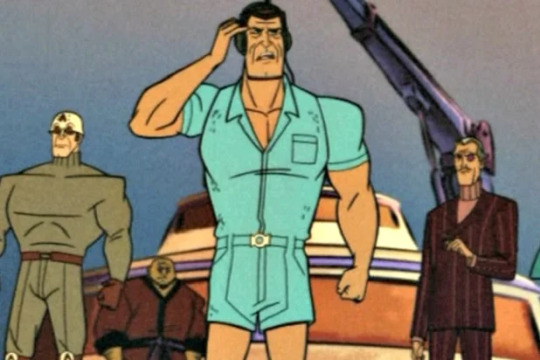
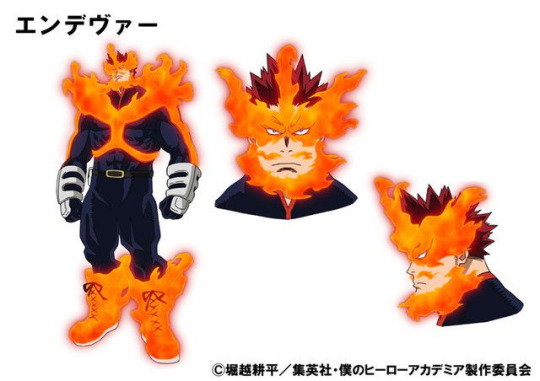
They're both extremely bulky men at peak levels of physical fitness. Meanwhile Rusty is a balding, short and out of shape middle aged man.
In story Jonas is still widley beloved by the public and is constantly praised, while no one but Rusty is aware of his faults, but there's a reason for that. Jonas is someone who is basically allowed to do anything he wants, because the patriarchy means all of society is built around letting men like Jonas succeed.
Jonas is also someone who literally uses his position as a hero to manipulate people into getting what he wants and glorify himself.
Jonas can casually destroy people's lives, all while still believing he's the good guy because in his world being good guy is just a role to play and he plays it well. One of the best three episodes of the series is the Morphic Trilogy, the opening to season 7 where some of Jonas's past crimes are revealed.
In the past he tricked a married man into making a sex tape with him, and then when that man Don Carraldo aka the Blue Morpho turned out to regret that, he used the tape to constantly blackmail him into doing his dirty work. Killing people in secret while Jonas Venture remained Squeaky clean. After years of being forced to act as a mercenary for Jonas, the Blue Morpho died in a plane crash. Jonas then revived his best friend as a cyborg. He got bored of his new cyborg within a few months and reassigned him to babysit his son Rusty. The cyborg glitched and started to strangle Rusty and then he snaps his friends neck, and throws the cyborg away in the garbage.
Jonas can just completely destroy a man's life because he can. Because everyone around him enables him and no one is going to stop him. Because this is how people in power act when they're given too much power. Because might does not make right.
He's the gold standard. He's the ideal. Who would question him?
Enji occupies a similar position in the story, where he fits the role of a hero so well that even when his family abuse is revealed to the public basically every character and their mom is tripping over themselves to defend him.

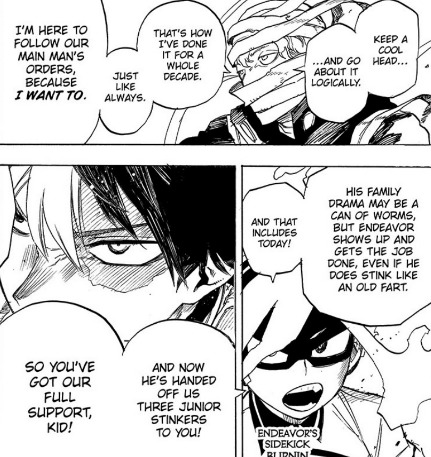
Jonas is constantly praised in story years after his death and every bad thing he's done is swept under the rug, but that's because number one Jonas was a manipulative monster, and number two it shows toxic masculinity is a false ideal. This is how Jonas who everyone thinks is the ideal man's man, really acts. This is what he gets away with it, because the thing society glorifies are toxic and bad.
When people bend over backwards to defend Endeavor what does it say exactly? Because we're supposed to believe that Enji's willing to work for redemption even if people don't forgive him. We're not supposed to think Enji is a manipulative monster intentionally twisting people around his finger like Jonas was.
There are some ways Enji is like Jonas, especially in his backstory. He did use his money and influence to buy a woman. Rei was definitely not going to get the option of divorcing him if she actually wanted to leave.
However, in the present time we don't see Enji doing the kind of manipulation that Jonas does, because really he doesn't have to. Hawks does it for him. There is a character in the narrative named Takami Keigo / Hawks who is a little boy that Enji indirectly saved as a child by putting his father in prison. Because of this he is obsessed with making Endeavor live up to the hero he imagined him to be when he was young, and does everything he can to prop Enji up behind the scenes and make him look like that hero to the public.
Hawks is a whole other can of worms, but in effect what this means is there is someone manipulating public opinion in favor of Endeavor so he'll be able to shine in spite of the numerous skeletons in his closet, it's just not Endeavor himself. Hawks also takes away a lot of the active decisions on Endeavor's part. When Endeavor chooses to ignore Toya in the latter part of the story, it's not Endeavor's choice, he's just following Hawks plan to fight AFO. When Endeavor makes a public apology, Hawks is the one who wrote it for him.
The result is that Endeavor comes off as less of a Jonas, after all Hawks is the one manipulating his public image. On the other hand, he's also less good of a character because he's not making choices anymore. It'd be better If Enji was trying to manipulate the public into forgiving him in the wake of his scandal, because that'd be an active choice on his part. When a character makes a choice it tells us something about who that character is.
Horikoshi doesn't want us to think that Enji is the kind of selfish monster that Jonas is, but then who is he supposed to be?
The entire point of this post is to compare Enji to Rusty, but Enji's far too successful to be Rusty. Rusty is a failure in basically everything he set out to do in life. He's the butt of the series jokes. He's the victim in as many ways as he's the perpetrator. He had a lot of money and then wasted it all. None of his inventions are succesful. The scientific community thinks he's a joke, or they don't even know who he is. Women won't even go near him. No one ever defends him. At no point in the story does someone stop and say "Hey, Hank I know your dad's an asshole but he's really good at science so that makes it okay."
Rusty's such a failure at being a hero that he's forced to be a person. He's as equally narcissticic and toxic as his father, he treats women like objects for sex and comfort like his father does, he just doesn't get away with it. You can't point to some heroic feat of his that justifies his toxic behavior because he doesn't have any.
The story however can't stop singing Enji's praises for what a good hero he is. He's never forced to step out of the role of hero and be a person like Rusty is, and because of that the message of his character becomes confused.
Are we supposed to think he's a manipulative narcissist like Jonas is? Are we supposed to think he's an incredibly flawed individual trying to figure out how to be a father late into his kid's lives like Rusty?
Rusty has a clear role in his story, and what the author wants to say with Enji is unclear.
Everyone praises Jonas to death and no one can see him for the terrible purpose he is, because that's the point. Venture Bros is about failure. It's about the death of the space ag optimisme. It's about how much the boomer generation sucked.
From the Radiant is the Baboon Heart Commentary. Question: Did Jonas only keep Rusty around for the press and his cloning tech or did he actually care about him? Answer: . The show has a villain called the monarch, but if you watch all the show the villain is Jonas Venture Sr. He is a bad dad. What you need to realize is that in this kind of baby boomers gen x millenials kind of thing we are of the generation that had bad parents. For the good and the bad of it. The good was we were all left alone by our parents, and we had a freedom in our thought that I don't think the millennials have. Because we made the millennials, and we were like You know what Our parents suck and we're gonna be great parents." And they helicoptered them and they gave playdates. [...] I did hate the boomers, they were awful fathers they were terrible people they did horrible things to our world, and at the time they were celebrated as good people. They were a bunch of hippies and they failed and they did everything wrong that they wanted to fix [...]. You and I are lost people we observed our generation. We are fully aware of it. We observed our parents generation. My actual father was a classic distant father, very bright had a lot of work to do, but I observed that generation and the way that toxic masculinity was set in stone. Just branded onto their tombstone. Toxic masculinity. Our generation grew up wanting to be adults, childhood was something that was not examined. When people were growing up we wanted to be grown ups, we wanted to wear suits, it was something you guys don't have. It was a very different way to grow up. So we wanted to be like this generation that immediately we looked at and went oh my god they're monsters. So Jonas Venture Sr. is a monster.
Jonas is a commentary on how much the boomer generation is glorified, and how much they suck if you look at them critically at all. It's written by authors who were observing basically three different generations of parenting, the way boomers parented, the ways Gen-Xers did in response to that and now the way millennials act as they reach adulthood. Rusty can't escape Jonas' shadow because Toxic Masculinity is set in stone.
The role of Jonas in the story is to serve as an antagonist to Rusty and be the cause of Rusty's struggles, and also his impetus to change because Rusty doesn't want to be like his father. Rusty and Jonas both exist as characters to show the author's observations on parenting through the generations, and yeah it's a very american idea of parenting and family but it's you know... a cartoon made in america.
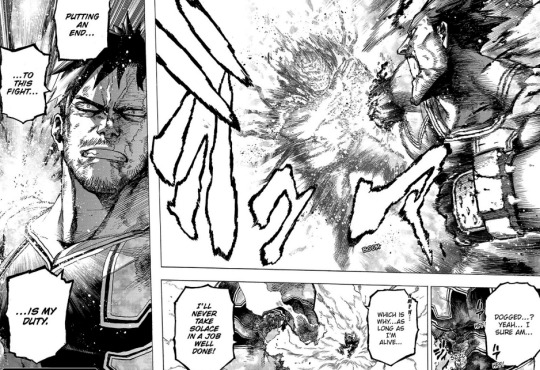
What is Endeavor's role of the story? If he's a criticism of toxic masculinity he's not criticized enough, because the story spends just as much time glorifying him his obsession with strength and power as it does criticizing him. There's no scenes like this for Rusty to show off how cool he is, or how determined. The story wants you to believe that there's something redeeming in the fact that Enji is always struggling to be the greatest, even though his obsession with being number one is what caused him to abuse his family in the first place
It's criticizing and praising Enji's obsession with power in the same breath, because My Hero Academia can't fully deconstruct toxic masculinity the way that Venture Bros can. It keeps trying to find something redeemable in Endeavor's toxic pursuit of power, but that's the whole point. Toxic masculinity isn't redeemable, because toxic masculinity is toxic. There's nothing wrong with masculinity itself, or the values people traditionally consider masculine but the kind of hyper-aggressive pursuit of physical strength Endeavor chases after is toxic masculinity. In Endeavor's mind men are warriors, protectors and providers and nothing else, and he never learns to be anything else either.
MHA would never treat Endeavor the way Vbros treats Rusty, constantly humiliating him or making him the butt of jokes. It would never make Enji out to be weak or pathetic the way Rusty is.
The central concept of Endeavor is struggle. His chosen hero nae "Endeavor" means to try hard to achieve something. His entire character is based around the concept of struggle. His central struggle is that he's a normal guy trying to compete with a superhero like all might, and everything he does he struggles with even if that struggle is pointless.
However, in the actual narrative itself he doesn't struggle. He definitely doesn't struggle the way Rusty does. Rusty's a lazy, incompetent, and entitled man sitting on a pile of money he didn't earn who thinks he's entitled to more who fails at all he sets out to achieve. Rusty never gets what he wants, and even when he does get what he wants like when his brother leaves him a billion dollar corporation in his will, he bankrupts that company in two seasons. Struggle means that the world isn't going to give you what you want and you keep trying anyway.
Endeavor's never subjected to nearly the same amount of narrative punishment that Rusty is. He's still well-respected. People defend him. He fights in all the major battles of the series and gets victories. No one's disgusted when they hear that he's a wife beater. We are told that he struggles, that the central concept of his character is struggle, but the narrative keeps handing him wins and cool moments.
As I've said above several times, Enji's never really forced to step out of the role as hero because he's not a failure the way Rusty is.
My Hero Academia hits some of the same notes as Venture Bros. It's criticizing apanese hegemonic masculinity, specifically that of salaryman masculinity and the way men in japan completely put their careers over their families. Read about it here in this convenient power point presentation. Enji is essentially an incredibly successful salaryman who has completely disappeared from his kid's lives in order to earn money and success and believes that he's still entitled to be a father because he's performed adequately in his role as earner of the household.
The story does show how giving too much power to the patriarch of a household can cause a house to fall apart. It shows that traditional family roles aren't all they're cracked up to be. Enji is assigned the role of father but he doesn't live up to it. The very rigid and traditional Todoroki Household crumbles because basically everyone fails to live up to their roles. The father isn't present. The mother isn't a good caretaker. The first born is defective. The youngest is given all the responsibility of the first born. No one is able to live up to those roles because maybe those rigid set in stone roles shouldn't exist in the first place.
Once again though, that's all in the backstory. Enji never changes from the Pro Hero Arc to his last showdown with Toya. The story never tells us anything about who Enji is as a person. Therefore, it also never comments on Enji's role as the patriarch. What is Horikoshi using Enji to say about patriarchy besides... it exists?
The story shows you how destructive the idea of patriarchy that Enji represents can be in the backstory, but because Enji doesn't do much for 90 percent of the story it never says anything about how Enji can learn to be a father or if it's even possible for him to be a father this late in the game. Because Enji's story isn't about fatherhood ultimately, it's about him becoming a less selfish hero.
Which might just be a problem with the whole of MHA. Venture Bros is about who the characters are outside of their identity as heroes and villains, but MHA is ultimately more about the optimism of heroes and what it means to be a hero than these characters personal lives.
Rusty is never going to be as sucessful as his father. He's always going to be mediocre, ad even if he's sympathetic he's still a scum bag. However, Rusty has one thing his father doesn't have which are his two sons who he made a deliberate decision to get closer to. Unlike a serial user of people Jonas, Rusty has the ability to actually love and care for people and he chooses to make those connections.
Endeavor never chooses to be a father. He didn't choose to go to Toya's side. He was too busy being a hero and fighting the big bad. As a result of that we never learn anything about Enji as a character outside of being a hero because he never chose to be anything other than a hero.
He also never failed. As I said the narrative kept handing him wins. You'd think never choosing to see Toya would mean he can't save Toya in the end, but in the end of the story Toya's just fine. There are no consequences to his choices. He's revealed to be an abuser to the public but he gets to keep being a hero. Enji never really fails in some big way that forces him to rfelect and change on his actions, so he just keeps doing the same thing from beginning to end.
Which is why Enji doesn't work as a character compared to Rusty. He doesn't fail. He's supposed to be a flawed protagonist struggling against himself, but he never really loses. He's too much like Jonas and not enough like Rusty.
"I think Jonas was something of a boy adventurer himself, and made his kid be it. But also put his kid on TV to cash in the residuals. He was just a shitty parent. When he went to bed he was just, he was moral, and he was fighting the good fight. When he woke up he ignored his son and made his son do terrible things. He voted for nixon like a good american. He was a winner and our show is not about winners. Our show is about losers and people we love." Jackson Publick. n
#venture bros#enji todoroki#mha meta#bnha meta#my hero academia#i put so much effort into this post only two people will read#rusty venture#doctor venture#doctor thaddeus venture#endeavor
424 notes
·
View notes
Text
2024 Year In Review
2024 was another intense year. It was the first time in twenty years I wasn’t scoring a show for TV, and I got to concentrate on finishing albums and starting new projects. The year began with the premiere of my chamber symphony for Alterity Chamber Orchestra in Orlando and ended with guest-vocalizing with the Losers Lounge Band on a Bowie classic at Joe's Pub in NYC. I completed new albums for Xordox and Venture Bros, to be released in 2025. I released an Archer Soundtrack album and scored a Harry Smith film for L’Etrange Festival in Paris. Worked with Laura Wolf on a new project and premiered my Ensemble project at the Big Ears Festival in Tennessee. Recorded many overdubs for the next Foetus album, also to be released in 2025. Began a new series of sculptural wall pieces. We lost Phill Niblock in January and Steve Albini in May. We lost my colleague Roli Mosimann in September. I still woke up 5am in a panic on too many occasions. As a cultural omnivore, many sights, sounds and stimuli penetrated me.
Albums that I enjoyed in 2024
Sleepytime Gorilla Museum of the Last Human Being (Pelagic) Present This is not the end (Cuneiform) Tristan Perich/Ensemble 0 Open Symmetry (Erased Tapes) Drew McDowall A Thread Silvered and Trembling (Dais) Warrington-Runcorn New Town Development Plan Your Community Hub (Castles In Space) Extra Life The Sacred Vowel (Bandcamp) Geordie Greep The New Sound (Rough Trade) D-en Haut D-en Haut (Pagan) Aksumi Fleeting Future + Lines (Tonal Union) Louis Cole Nothing (Brainfeeder) Uniform American Standard (Sacred Bones) Zeal and Ardor Greif (Redacted) Shellac To All Trains (Touch and Go) Bangladeafy Vulture (Nefarious Industries) Ekko Astral Pink Balloons (Topshelf Records) Kee Avil Spine (Constellation) Fennesz Mosaic (Touch) Marewren Ukouk Round singing Voices of the Ainu 2012-2024 (Pingipung) Elysian Fields What The Thunder Said (Ojet) Melvins Tarantula Heart (Ipecac) Blood Incantation Absolute Elsewhere (Century Media) Aoife O’Donovan All My Friends (Yep Roc) Anna Thorvaldsdottir Aerial (Sono Luminus) Grace Bergere A Little Blood (Casa Gogol) Bob Vylan Humble As The Sun (Ghost Theatre 2) Andy Akiho Kin (Aki Rhythm) Yannis Kyriakides Hypnokaseta (Unsounds) Big | Brave A Chaos of Flowers (Thrill Jockey) The The Ensoulment (Cinéola / earMUSIC) Beth Gibbons Lives Outgrown (Domino) Beak >>>> / Kosmik Musik (Invada) Sebastian Tropic OST (Ed Banger) Chaser Planned Obsolescence (Decoherence Records) Jesus Lizard Rack (Ipecac) Ex East Islander Norther (Rocket Recordings)
Some books I enjoyed
Yuval Noah Harari Nexus Chris Stein Under A Rock Bill Buford Among The Thugs Patricia Highsmith The Talented Mr Ripley Sy Montgomery Soul Of An Octopus Malcolm Gladwell Revenge Of The Tipping Point
Some films I enjoyed
Furiosa ZEF Story Of Die Antwoord Joker Folie A Deux Kneecap Bad Faith Rebel Ridge Hundreds Of Beavers Ministry Of Ungentlemanly Behavior Teachers Lounge
I saw hundreds of concerts in 2024. Some highlights:
01.24.24 The Chisel at Bowery Ballroom 02.15.24 Jack Quartet play Austin Wulliman at Roulette Intermedium NYC. 03.09.24 Louis Cole / Genevieve Artadi at Brooklyn Steel 03.14.24 Kate NV at the Atrium at Lincoln Center 03.18.24 Sleepytime Gorilla Museum at Elsewhere in Brooklyn 03.23.24 Secret Chiefs 3 at Big Ears Festival 03.23.24 Hatis Noit at St John’s Cathedral in Knoxville TN for the Big Ears Festival 03.24.24 Kenny Wollesen’s Sonic Massage at Knoxville Art Museum for the Big Ears Festival 03.24.24 Elliott Sharp’s Void Patrol (with guests Cyro Batista and Colin Stetson) at Big Ears Festival 03.24.24 Aoife O'Donovan with the Knoxville Symphony Chamber Orchestra at the Big Ears Festival 04.01.24 Caleb Landry Jones at The Sultan Room i 04.06.24 Lovely Little Girls at Hart Bar. 04.19.24 Keith Fullerton Whitman performs ‘Playthroughs’ at Ambient Church 04.23.24 Mandy Indiana at Elsewhere in Brooklyn 04.26.24 Knower at the Brooklyn Bowl 05.04.24 Oberlin Contemporary Music Ensemble, directed by Tim Weiss, play Alex Paxton at Long Play Festival 05.04.24 Fuji|||||||||||ta at Long Play Festival 05.05.24 Ligeti Quartet perform Ligeti + Anna Meredith at Long Play Festival 05.17.23 Swans at Music Hall of Williamsburg 05.23.24 The Rolling Stones played at Met Life Stadium in New Jersey. 05.24.24 John Zorn’s ensemble, the New Masada Quartet 06.08.24 Rebekah Heller’s Bassoon Ensemble 06.25.24 Mdou Moctar at Bowery Ballroom NYC 07.12.24 C.Gibbs Review at Barbes 07.23.24 Bangladeafy at The Sultan Room in Brooklyn 08.18.24 Kid Congo and the Pink Monkey Birds at Union Pool 08.23.24 Alarm Will Sound play Marcos Balter’s Code-Switching, 09.30.24 Uniform at Bowery Ballroom 09.04.24 King Dunn aka King Buzzo (Melvins) and Trevor Dunn (Mr Bungle etc) at Music Hall of Williamsburg + White Eagle Hall in Jersey City. 09.13.24 Steven Bernstein and Nels Cline with the Arturo O'Farrill Latin Jazz Orchestra, playing James Bond themes. At Bryant Park in NYC. 09.15.24 PJ Harvey at Terminal 5, NYC 10.11.24 John Zorn’s Cobra in a 40th anniversary performance at Roulette Intermedium in Brooklyn 10.17.25 The The played at the Beacon Theater 10.22.24 Die Antwoord at Brooklyn Steel, 10.23.24 Boris played at Racket in NYC. 11.01.24 William Basinski for Age Of Reflections 11.04.24 Growing performing for Abasement at Artists Space in Manhattan 11.06.24 Pioneer Works presented a concert of Louis Cole Choral Music. 11.08.24 Lankum at Warsaw in Brooklyn 11.17.24 sunn o))) at Lincoln Center for the Unsound Festival 11.21.24 Extra Life at TV Eye. 11.24.24 Zeal and Ardor at Le Poisson Rouge NYC 11.25.24 Axiom, comprised of Juilliard students and conducted by Jeffrey Milarsky playing Solstice Ritual by Augusta Read Thomas 11.26.24 Blood Incantation at Elsewhere 12.01.24 Pharmakon’s awesomely unhinged performance at Union Pool. 12.11.24 Jesus Lizard played a great set at Brooklyn Steel 12.28.24 Grace Bergere / Jon Spencer / Gogol Bordello Capitol Theater Port Chester
Honorable mention to the multiple concerts I attended at the Abasement series at Artist Space, as well as multiple shows by S.E.M. Ensemble and Wet Ink Ensemble
#Extra Life#Zeal and Ardor#playlist#jg thirlwell#Augusta Read Thomas#Blood Incantation#Jesus Lizard#Grace Bergere#Jon Spencer#Gogol Bordello#Abasement#S.E.M. Ensemble#Wet Ink Ensemble#Pharmakon#Sleepytime Gorilla Museum#Ex East Islander#William Basinski#Fuji|||||||||||ta#Louis Cole#knower#uniform#Jack Quartet#Mdou Moctar#Tristan Perich#Warrington-Runcorn New Town Development Plan#chaser#Geordie Greep#Boris#Die Antwoord#The The
49 notes
·
View notes
Text

Cover for that guide I was gonna make, but that did not turn out how I wanted (and that I now have no time to fully dedicate myself to). I might post the guide in text form: Add a drawing, and write the rest. But we'll see.
#The Wiccen Society#blorbos from my head#wildflower soul lore#my art#I used Jackson Publick's Venture Bros pitch book as inspo for it#I'll tackle it again someday probably but I have to have my head screwed on right#so who knows???#oc art#illustration#artists on tumblr
5 notes
·
View notes